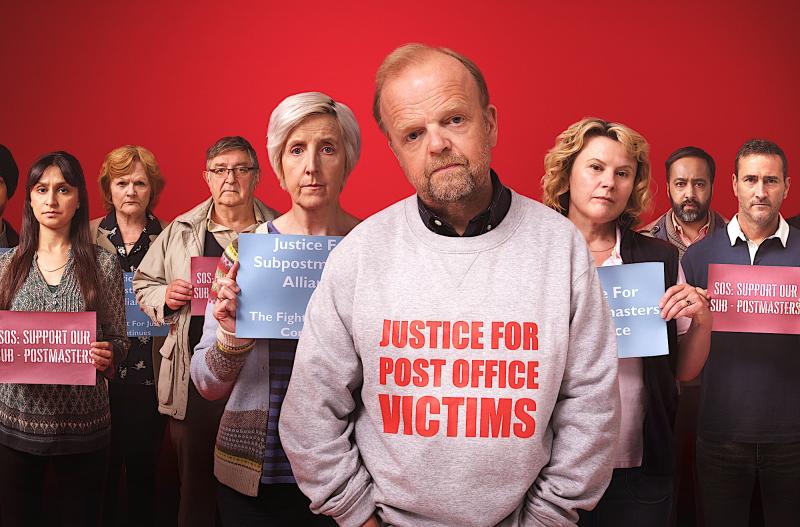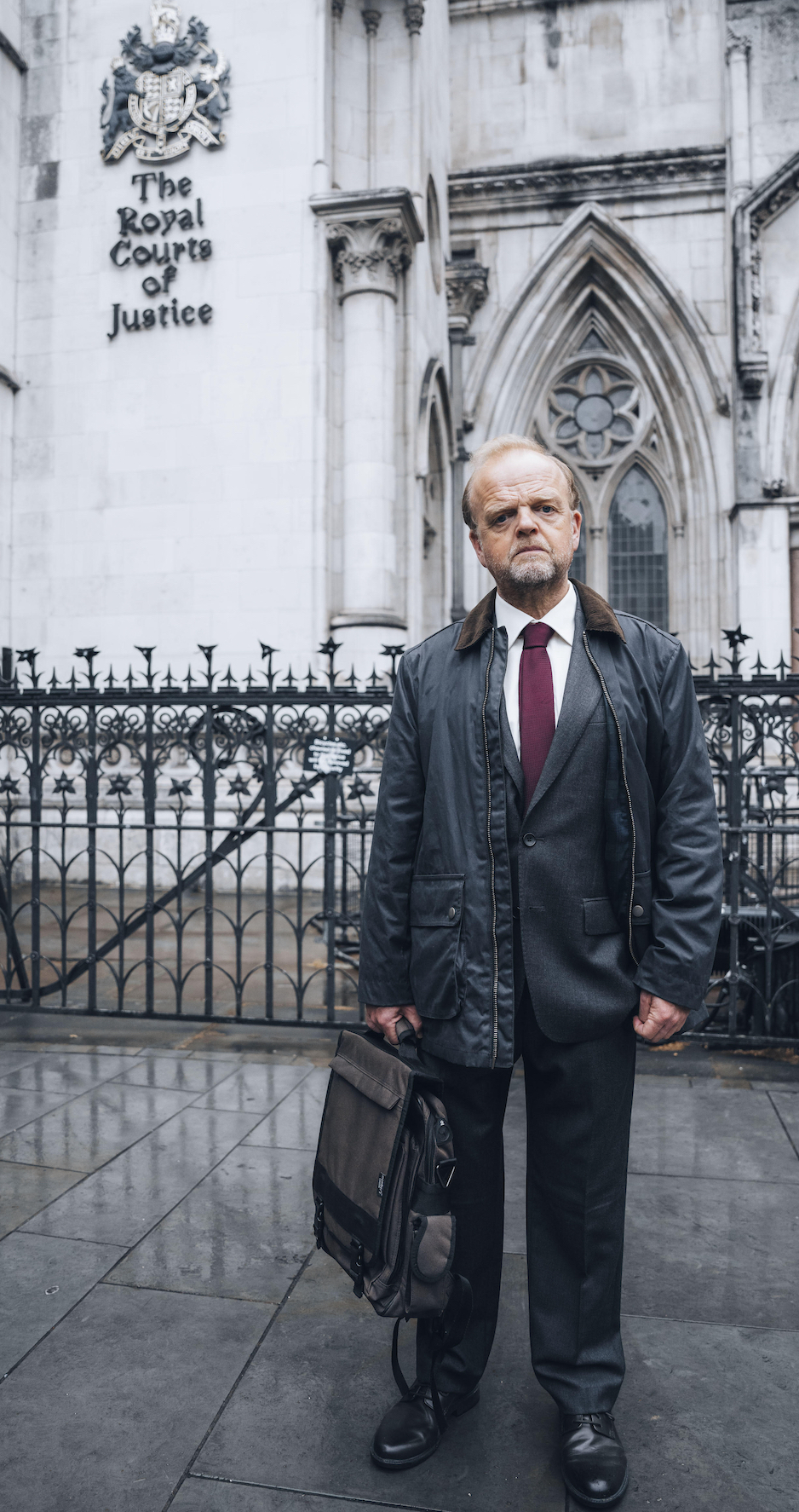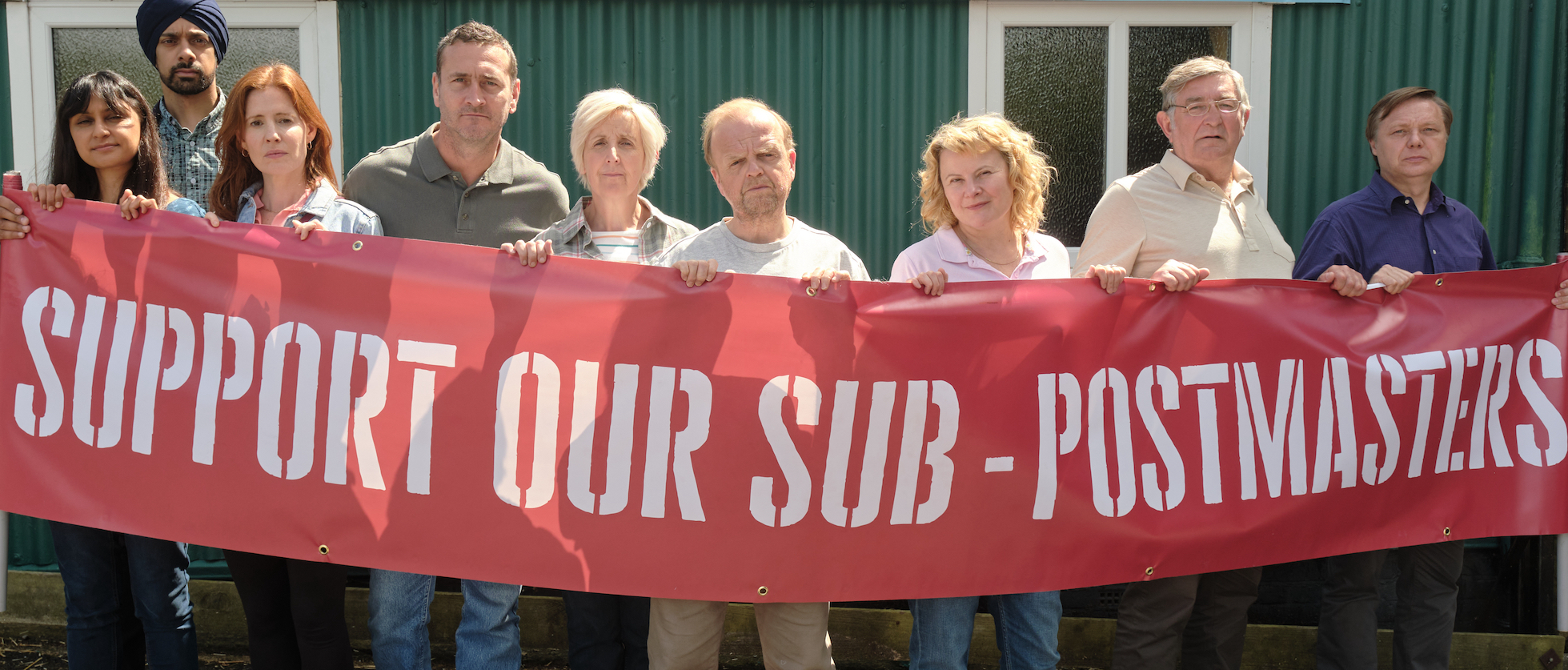Mr Bates vs The Post Office, ITV1 review - a star-packed account of an incendiary story | reviews, news & interviews
Mr Bates vs The Post Office, ITV1 review - a star-packed account of an incendiary story
Mr Bates vs The Post Office, ITV1 review - a star-packed account of an incendiary story
As the toxic Post Office scandal rumbles on, this four-parter gives its fallout a human face

There isn’t a troupe officially called the Worshipful Company of British Character Actors, but there probably should be, given the sterling service it does for the nation, acting in prestige TV dramas based on real events. Toby Jones and Monica Dolan regularly top the bill in this genre, as they do in ITV’s Mr Bates vs The Post Office.
This level of star casting says a lot about the aims of this four-parter. It’s in the same vein as true-crime docudramas such as Appropriate Adult and The Sixth Commandment, but with its eye fixed on a wider, mass audience. The incendiary story it tells — of the Post Office’s prosecution for fraud and accounting errors of some 3,500 of those running its branches, leading to 700 convictions and destroying livelihoods, reputations and at least four lives — deserves nothing less.
Commanding headlines still as the compensation process drags on and calls for high-level prosecutions get louder, this scandal is being called the greatest miscarriage of justice in British history. Its victims were users of Fujitsu’s Horizon software system, installed in post offices in 2000 to revolutionise their stocktaking. Instead, it wildly misrepresented their end-of-day totals and left them personally responsible for repaying the eye-watering “deficits”.
Gwyneth Hughes’s script lands us in the thick of it, with the arrival of Post Office heavies to close down the Llandudno branch run by Alan Bates (Toby Jones, pictured below) in 2006. Bates refused to sign off the error-strewn figures his Horizon system created, thereby evading prosecution. But as a result he has to walk away from the branch, his home and his town, to live in rural isolation with his partner Suzanne (Julie Hesmondhalgh).
 From this base camp, armed with a loft-full of boxes containing all his post-Horizon transactions, he becomes a Luke Skywalker-style resistance leader, twigging early on that he is being lied to about being the only one reporting problems. He sets out to find the thousands of others. Their campaign for justice slowly begins to snowball, aided by a forensic accountant (an impressively crisp Ian Hart) and MP James Arbuthnot (Alex Jennings) – “A Tory MP being nice!” marvels Suzanne sophomorically. Soon a lawyer has joined them to advise them how to fight back.
From this base camp, armed with a loft-full of boxes containing all his post-Horizon transactions, he becomes a Luke Skywalker-style resistance leader, twigging early on that he is being lied to about being the only one reporting problems. He sets out to find the thousands of others. Their campaign for justice slowly begins to snowball, aided by a forensic accountant (an impressively crisp Ian Hart) and MP James Arbuthnot (Alex Jennings) – “A Tory MP being nice!” marvels Suzanne sophomorically. Soon a lawyer has joined them to advise them how to fight back.
The bare facts of the story make the blood boil and the senses reel. Giving them a human face are characters such as desperate family man Lee Castleton (a poignant Will Mellor), bankrupted by his ordeal, and affable Jo Hamilton (Monica Dolan), who runs a sub-post office in her village tea room but is reduced to near-insanity as she watches the false total in her accounts doubling before her eyes – while she is desperately seeking help on the Horizon helpline.
When an official inquiry is set up into the wrongful convictions, though, Jo is prevented from giving compelling evidence to it precisely because, like many others, she saw no recourse but to plead guilty to the charges and ended up with a criminal record, all thanks to the very system under investigation. Kafka would have rubbed his hands with glee at that bleak twist.
Oddly, though, it’s the facts that compel rather than the packaging of them here. If the material had been deployed as a documentary, with expert talking heads and anonymous whistleblowers landing blow after blow on the Post Office’s senior management and the top brass at Fujitsu, it could have been an all-out blistering attack. But the producers have opted to focus on the casualties of the debacle in a more gentle way that borders on a comedy of manners at times.
It’s a genre Jones is a dab hand at. He is given some icily angry speeches as the enormity of the injustice and corporate dysfunction he has helped uncover becomes clear, but he is mostly calm and measured, even droll, in the usual Jones style. But in this, I discovered from seeing videos of him, he resembles the real Alan Bates.
Even so, is this well behaved drama the best way to deliver this devastating story? As I watched the final scene, where Alan and Suzanne stand on a peak, vindicated, surveying the wonderful view, I yearned for the standard end titles of this genre, conveying brutal truths.
Here they could have been: “Only 70 postmasters have gone to the appeal court to have their convictions overturned”; “only 29 have so far agreed terms for their compensation, and 59 have died without receiving any”; “the Post Office recently renewed its contract for Fujitsu’s Horizon system until 2025”. (All these and other facts about the case are available in quality newspapers.)
 This mild-mannered tone is partly the point. These are not firebrands or agitators, they are decent, trusted people performing a public service, handing out pension money, processing parcels, doing their bit to hold communities together. Their story isn’t one of screeching cars and noisy violence. Many suffered the destruction of their lives in silence; some couldn’t take it, like Martin Griffiths (Colin Tierney), whose massive “debts” and loss of self-respect led him to obliterate himself entirely.
This mild-mannered tone is partly the point. These are not firebrands or agitators, they are decent, trusted people performing a public service, handing out pension money, processing parcels, doing their bit to hold communities together. Their story isn’t one of screeching cars and noisy violence. Many suffered the destruction of their lives in silence; some couldn’t take it, like Martin Griffiths (Colin Tierney), whose massive “debts” and loss of self-respect led him to obliterate himself entirely.
Yet after 18 years of slow progress, there’s a slightly disappointing destination to the action, partly because the scandal is far from resolved, but also because, as in real life, the senior people at Fujitsu, at the Post Office and in government, all of whom should have stopped the madness at its first appearance, are invisible except for two top Post Office executives, Paula Vennells (Lia Williams) and Angela Van den Bogerd (Katherine Kelly). Both are portrayed as two-dimensional “corporates” with hardly a trace of humanity, or personality.
Maybe this too is true to life, but as we watch these slickly dressed careerists smash the lives of their homespun victims, we realise we know nothing about the PO’s motives or the psychology of its executives, beyond the need they announce in court to “protect the brand”. The true horror of this toxic, shameful scandal still awaits savage forensic scrutiny. But this is a welcome first stir of the pot.
Add comment
The future of Arts Journalism
You can stop theartsdesk.com closing!
We urgently need financing to survive. Our fundraising drive has thus far raised £49,000 but we need to reach £100,000 or we will be forced to close. Please contribute here: https://gofund.me/c3f6033d
And if you can forward this information to anyone who might assist, we’d be grateful.

Subscribe to theartsdesk.com
Thank you for continuing to read our work on theartsdesk.com. For unlimited access to every article in its entirety, including our archive of more than 15,000 pieces, we're asking for £5 per month or £40 per year. We feel it's a very good deal, and hope you do too.
To take a subscription now simply click here.
And if you're looking for that extra gift for a friend or family member, why not treat them to a theartsdesk.com gift subscription?
more TV
 The Guest, BBC One review - be careful what you wish for
A terrific Eve Myles stars in addictive Welsh mystery
The Guest, BBC One review - be careful what you wish for
A terrific Eve Myles stars in addictive Welsh mystery
 theartsdesk Q&A: Suranne Jones on 'Hostage', power pants and politics
The star and producer talks about taking on the role of Prime Minister, wearing high heels and living in the public eye
theartsdesk Q&A: Suranne Jones on 'Hostage', power pants and politics
The star and producer talks about taking on the role of Prime Minister, wearing high heels and living in the public eye
 King & Conqueror, BBC One review - not many kicks in 1066
Turgid medieval drama leaves viewers in the dark
King & Conqueror, BBC One review - not many kicks in 1066
Turgid medieval drama leaves viewers in the dark
 Hostage, Netflix review - entente not-too-cordiale
Suranne Jones and Julie Delpy cross swords in confused political drama
Hostage, Netflix review - entente not-too-cordiale
Suranne Jones and Julie Delpy cross swords in confused political drama
 In Flight, Channel 4 review - drugs, thugs and Bulgarian gangsters
Katherine Kelly's flight attendant is battling a sea of troubles
In Flight, Channel 4 review - drugs, thugs and Bulgarian gangsters
Katherine Kelly's flight attendant is battling a sea of troubles
 Alien: Earth, Disney+ review - was this interstellar journey really necessary?
Noah Hawley's lavish sci-fi series brings Ridley Scott's monster back home
Alien: Earth, Disney+ review - was this interstellar journey really necessary?
Noah Hawley's lavish sci-fi series brings Ridley Scott's monster back home
 The Count of Monte Cristo, U&Drama review - silly telly for the silly season
Umpteenth incarnation of the Alexandre Dumas novel is no better than it should be
The Count of Monte Cristo, U&Drama review - silly telly for the silly season
Umpteenth incarnation of the Alexandre Dumas novel is no better than it should be
 The Narrow Road to the Deep North, BBC One review - love, death and hell on the Burma railway
Richard Flanagan's prize-winning novel becomes a gruelling TV series
The Narrow Road to the Deep North, BBC One review - love, death and hell on the Burma railway
Richard Flanagan's prize-winning novel becomes a gruelling TV series
 The Waterfront, Netflix review - fish, drugs and rock'n'roll
Kevin Williamson's Carolinas crime saga makes addictive viewing
The Waterfront, Netflix review - fish, drugs and rock'n'roll
Kevin Williamson's Carolinas crime saga makes addictive viewing
 theartsdesk Q&A: writer and actor Mark Gatiss on 'Bookish'
The multi-talented performer ponders storytelling, crime and retiring to run a bookshop
theartsdesk Q&A: writer and actor Mark Gatiss on 'Bookish'
The multi-talented performer ponders storytelling, crime and retiring to run a bookshop
 Ballard, Prime Video review - there's something rotten in the LAPD
Persuasive dramatisation of Michael Connelly's female detective
Ballard, Prime Video review - there's something rotten in the LAPD
Persuasive dramatisation of Michael Connelly's female detective
 Bookish, U&Alibi review - sleuthing and skulduggery in a bomb-battered London
Mark Gatiss's crime drama mixes period atmosphere with crafty clues
Bookish, U&Alibi review - sleuthing and skulduggery in a bomb-battered London
Mark Gatiss's crime drama mixes period atmosphere with crafty clues

Comments
Helen asks: "is this well
Helen asks: "is this well behaved drama the best way to deliver this devastating story?"
Yes it is!
Which other drama-documentaries have had the impact these have had? None that I can think of.
So well done the "Worshipful Company of British Character Actors" and their creative team for doing what could and should have been done years ago, if anyone in the British news media had been interested enough.
And congratulations too to ITV for this example of great public service broadcasting.
Hi Tom -- I totally agree
Hi Tom -- I totally agree that the impact of the series has been beyond everybody's imagining, including its own producers, who aopparently expected it to be seen in low numbers opposite The Tourist and The Traitors. But if you go online you will see that Nick Wallis started trying to get people interested in the story back in 2011, making two Panoramas about it. Certain broadsheet newspapers have also kept stirring away, as have local papers in the areas where victims lived. I felt the ITV handling of the story was a bit too soft-pedalled. But I admit I was wrong!
Evidently you got a pre
HI Alex.. Thanks for this
HI Alex.. Thanks for this point: I actually watched the whole series on ITVX, on Jan 2. But I definitely watched to the end, waiting until the cast credits had rolled before switching off. Did the end titles appear after that, unusually?